|
|
|
Sort Order |
|
|
|
Items / Page
|
|
|
|
|
|
|
| Srl | Item |
| 1 |
ID:
155941
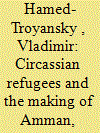

|
|
|
|
|
| Summary/Abstract |
In the final decades of Ottoman rule, several waves of refugees from the Russian Empire's North Caucasus region immigrated to Transjordan, where they founded Amman and other agricultural villages. This article examines the economy of Amman in its formative years as a Circassian refugee settlement. By exploring connections between North Caucasian refugees, Syrian and Palestinian merchants, and Transjordanian urban and nomadic communities, this study posits refugees as drivers of economic expansion in the late Ottoman period. I argue that the settlement of North Caucasian refugees and their active participation in the real estate market in and around Amman contributed to the entrenchment of the post-1858 property regime in Ottoman Transjordan. Through a study of an upper-class Circassian household and its legal battles, this article also illustrates the rise of refugee elites who benefited from the commodification of land and the construction of state-sponsored infrastructure in the late Ottoman Levant.
|
|
|
|
|
|
|
|
|
|
|
|
|
|
|
|
| 2 |
ID:
117599
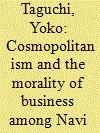

|
|
|
|
|
| Publication |
2012.
|
| Summary/Abstract |
Based on anthropological fieldwork, this article confirms that arguments about the decline of Mumbai's cosmopolitanism through the rise of regionalism and hindutva have failed to consider the idea of 'cosmopolitanism' as understood and used by local people, specifically local merchants. Reconsideration of cosmopolitanism in relation to regionalism focuses on the morality of business, as expressed by merchants in Navi Mumbai, is examined through two case scenarios. The Marathisation of signboards led by the Maharashtra Navnirman Sena (MNS) and participation in the Ganesh Festival show that their morality of business enables Navi Mumbai's merchants to adjust to various kinds of challenging phenomena, including those seen as regionalism. The same business morality, then, skillfully re-constructs the foundations of cosmopolitanism as a polyphonic folk term.
|
|
|
|
|
|
|
|
|
|
|
|
|
|
|
|
| 3 |
ID:
086870
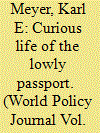

|
|
|
|
|
| Publication |
2009.
|
| Summary/Abstract |
No document confers as much awesome power as the lowly passport. It can save or claim lives, liberate or incarcerate, speed or derail passage through ports of entry. It can sow diplomatic havoc, or indeed (as it has)cause a government to fall.
|
|
|
|
|
|
|
|
|
|
|
|
|
|
|
|
| 4 |
ID:
178954
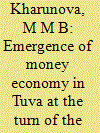

|
|
|
| 5 |
ID:
106370
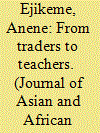

|
|
|
|
|
| Publication |
2011.
|
| Summary/Abstract |
In Onitsha, an important commercial center in Nigeria, success as a merchant was the usual route for women who aspired to elite status in the period before the 1930s. In 1928, a school for girls was opened by the Holy Rosary Sisters, a Catholic order created especially by the bishop in charge of Onitsha Diocese. The opening of this convent school in Onitsha heralded a major transformation in the lives of Onitsha women, marking the transition between two epochs with regard to how women achieved elite status. From the mid-1930s a new class of elite women began to appear in Onitsha, all products of mission education; this transition from traders to teachers marks a major shift in the lives and roles of elite women. The colonial government contributed to this transformation with policies that undermined women's ascendancy in the market by placing men in leadership positions there.
|
|
|
|
|
|
|
|
|
|
|
|
|
|
|
|
| 6 |
ID:
115291
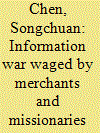

|
|
|
|
|
| Publication |
2012.
|
| Summary/Abstract |
This paper explores the efforts and impact of the Society for the Diffusion of Useful Knowledge in China (1834-1839), which existed during the five years before the First Opium War. It contends that the Society represented a third form of British engagement with the Chinese, alongside the diplomatic attempts of 1793 and 1816, and the military conflict of 1839-1842. The Society waged an 'information war' to penetrate the information barrier that the Qing had established to contain European trade and missions. The foreigners in Canton believed they were barred from further access to China because the Chinese had no information on the true character of the Europeans. Thus, they prepared 'intellectual artillery' in the form of Chinese language publications, especially on world geography, to distribute among the Chinese, in the hope that this effort would familiarize the Chinese with the science and art of Westerners and thereby cultivate respect and a welcoming atmosphere. The war metaphor was conceived, and the information war was waged, in the periphery of the British informal empire in Canton, but it contributed to the conceptualization of war against China, both in Canton and in Britain, in the years before actual military action. Behind the rhetoric of war and knowledge diffusion in Canton, lay a convergence of interests between merchants and missionaries, which drove both to employ information and military power to further their shared aim of opening China up for trade and proselytizing.
|
|
|
|
|
|
|
|
|
|
|
|
|
|
|
|
| 7 |
ID:
164145
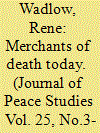

|
|
|
| 8 |
ID:
123371


|
|
|
|
|
| Publication |
2013.
|
| Summary/Abstract |
The end of the cold war witnessed the emergence of a commercial web sprawling from the Xinjiang Uighur Autonomous Region in western China and extending into Central Asia (Kazakhstan, Kyrgyzstan, Tajikistan, Turkmenistan, and Uzbekistan), Pakistan, and Russia. Running parallel to the state-managed exchange in hydrocarbons, raw materials, technology, and infrastructure, this new Eurasian trade had an informal component as everyday consumer items manufactured in China were imported into neighboring countries, bypassing formal regulatory mechanisms. This inter-Asian trade began as shuttle trading by itinerant merchants for local markets; by the mid 1990s, shuttle trading was overshadowed by large-scale export for national markets in neighboring countries without losing its informal character. This informality extending across national boundaries defined the post-cold war commerce in innermost Asia; at the same time, it also signaled a return to pre-cold war trading structures. Moving away from the "retreat of the state" thesis that found traction following the cold war, the author attributes informality in this inter-Asian trade to three factors: (1) a restructuring of state power where informal trade was a new comparative advantage sought in an evolving geopolitical climate; (2) the actors in this inter-Asian trade - party and regional officials in China, along with traders and intermediaries - who found and exercised agency through this exchange; and (3) a chain of inter-locking, commercial macro-regions, which are economically sustainable and which transcended international boundaries. Working in conjunction, these factors constitute a dynamic inter-Asian trade and challenge static state imaginaries of a "New Silk Road" or "Eurasian Continental Bridge."
|
|
|
|
|
|
|
|
|
|
|
|
|
|
|
|
| 9 |
ID:
059953
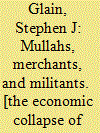

|
|
|
|
|
| Edition |
1st ed.
|
| Publication |
New York, St. Martin Press, 2004.
|
| Description |
x, 350p.Hbk
|
| Standard Number |
0312329113
|
|
|
|
|
|
|
|
|
|
|
|
Copies: C:1/I:0,R:0,Q:0
Circulation
| Accession# | Call# | Current Location | Status | Policy | Location |
| 049302 | 909.0974927/GLA 049302 | Main | On Shelf | General | |
|
|
|
|
| 10 |
ID:
181333
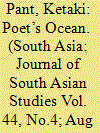

|
|
|
|
|
| Summary/Abstract |
This essay explores an unusual vernacular source of poetic writings by Asim Randeri (1904–2009), a Muslim poet from a merchant family of Gujarat, in order to understand how the imagination—particularly when engaged through poetry and piety—became a charged realm in which Indian Muslims responded to British colonial pressure on them, expressing the itinerancy at the heart of mercantile life that separated individuals from their families, port city and wider community. Recent scholarship has focused on the economic pursuits of Gujarati merchants in port cities across the Indian Ocean in the nineteenth and twentieth centuries and even earlier. This article shifts the analysis to their diasporic imagination, as a correlate of itinerant commerce. Through this essay, I reflect on the many temporalities and internal social dynamics at play in the mercantile imaginations that emerge from Gujarati trader communities. These, I demonstrate, provide a sharp contrast to the short-term framing emphasised by Western historiographical traditions rooted in linear history and colonial records.
|
|
|
|
|
|
|
|
|
|
|
|
|
|
|
|
| 11 |
ID:
163879
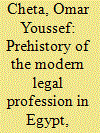

|
|
|
|
|
| Summary/Abstract |
This article examines the emergence of a new corps of legal practitioners in Egypt during the 1860s and early 1870s. The proceedings of hundreds of merchant court cases in mid-19th-century Cairo are replete with references to deputies and agents (wukalā; sing. wakīl) who represented merchant-litigants in a wide range of commercial disputes. Examining how these historical actors understood Egyptian, Ottoman, and French laws, and how they strategically deployed their knowledge in the merchant courts, this article revises the commonly accepted historical account of the founding of the legal profession in Egypt. Specifically, it argues that norms of legal practice hitherto linked to the establishment of the Mixed Courts in 1876 were already being formed and refined within the realm of commercial law as part of a more comprehensive program of legal reforms underway during the middle decades of the 19th century. In uncovering this genealogy of practice, the article reevaluates the extent to which the khedival state shared a legal culture with the Ottoman center, and, simultaneously, created the space for a new form of legal representation that became ubiquitous under British, and, subsequently, postcolonial rule.
|
|
|
|
|
|
|
|
|
|
|
|
|
|
|
|
| 12 |
ID:
108984
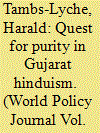

|
|
|
|
|
| Publication |
2011.
|
| Summary/Abstract |
Gujarat has been profoundly marked by its location at the centre of traditional trade networks which, I have argued elsewhere, has strengthened the position of its merchant communities relative to other parts of India. Here I propose that merchant religion, with its stress on purity, has displaced folk Shaktism as well as Brahminic ritual among Gujarat's wider population, to form the core of a modern Gujarati Hinduism, which includes Hindutva. This development, I hold, has been imbricated in the spread of bourgeois culture, making for a particular religious colouring of modernity in Gujarat, and contrasting with the 'secularism' which-perhaps exaggeratedly-has been held to characterise Occidental modernity.
|
|
|
|
|
|
|
|
|
|
|
|
|
|
|
|
| 13 |
ID:
120068


|
|
|
|
|
| Publication |
2013.
|
| Summary/Abstract |
In this article, I argue that commercial legislation promulgated and implemented in Egypt during the first half of the 19th century was one of several factors that diminished the effect of merchants' social networks, reduced merchants' identity to a purely professional dimension, and made profit dependent upon association with the state. The transformation of merchants' social roles was not part of a natural evolution toward modernization and the specialized division of labor. Rather, it resulted from interactions between state-building endeavors, pressures from established merchants who sought to parry threats to their position while profiting from new business opportunities, and an influx of merchants from outside the Ottoman sultanate, who could draw neither on personal connections nor on knowledge of local markets but instead had to depend on the protection of the European consulates and the influence of the growing Egyptian state apparatus.
|
|
|
|
|
|
|
|
|
|
|
|
|
|
|
|
|
|
|
|
|